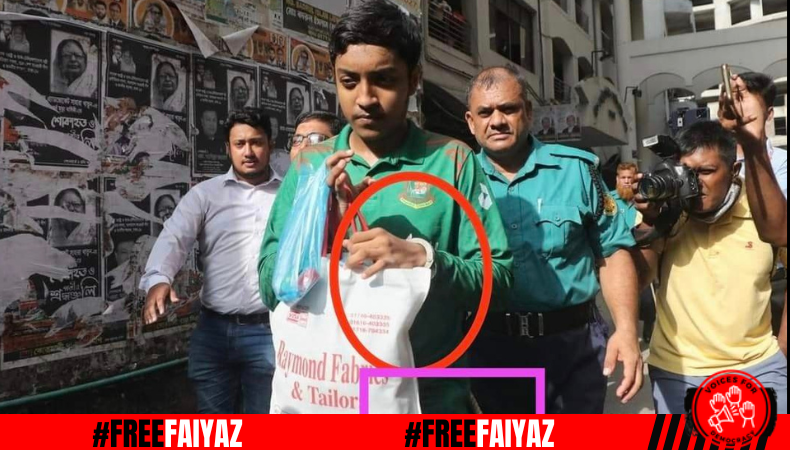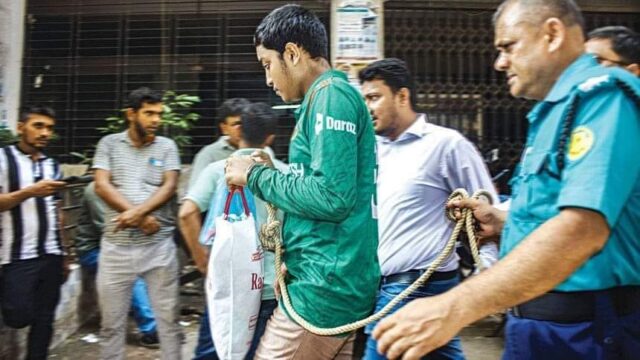
After studying law and earning LLB and LLM degrees, one wonders what the future holds. Why do law books seem so worthless to me now? The answer lies within this picture. After reading piles of law books, what are we really learning, and how is the law actually being applied in this country? Seeing all this leads to extreme frustration!

I’ll present a simple legal explanation of how granting a 7-day remand for this child named Faiyaz was a severe violation of the law, so everyone can understand.
-
- Many may not know that there is a law called the Children Act, 2013, which takes precedence over all other existing laws. According to Section 3 of the Children Act: “Notwithstanding anything contained in any other law for the time being in force, the provisions of this Act shall prevail.” This means that no matter what other laws say about the trial, arrest, or detention of an accused person, if the accused is a child, everything must be done according to the Children Act, and no other law will be applicable.
- The question is—was Faiyaz a ‘child’ according to the law? The answer is—absolutely. His lawyer presented his birth certificate and academic certificates in court, showing his age to be 17 years and 3 months. Faiyaz passed SSC in 2024 and had just enrolled in the first year of intermediate at Dhaka College; his classes hadn’t even started.
Section 4 of the Children Act clearly states that everyone under 18 is a child. Therefore, no proceedings other than those under the Children Act can be carried out against Faiyaz.
- He was tried in the Magistrate’s Court like everyone else. However, under the Children Act, only the ‘Children’s Court’ has jurisdiction to try a child, under no circumstances any other court. This means that the entire process of his trial was beyond legal process.
- Look at the attached picture. He is wearing handcuffs and has a rope around his waist. However, Section 44(3) of the Children Act states that after arresting a child, the police cannot under any circumstances handcuff or bind the child with a rope or string.
- There is a serious allegation from Faiyaz’s family. After his arrest, they were not informed about his whereabouts for four days. The police produced him in court on the fourth day, yet the family was not informed. The family searched for him in the court premises every day during these four days. Finally, on the fourth day, they found him by coincidence. This is a serious violation of the law. It was mandatory to inform the family immediately upon his detention. Even during court proceedings under the Children Act, it is a legal requirement to have a guardian present. But the police did everything without informing the family. For four days, they had no information about his whereabouts. This is a grave violation of the law.
- Can the court remand a child?
Section 4 of the Children Act clearly states that everyone under 18 is a child. Therefore, no proceedings other than those under the Children Act can be carried out against Faiyaz. - Was Faiyaz entitled to bail? Absolutely. Section 52 of the Children Act provides clear instructions regarding bail. The Children Act is a special law. According to this law, the police themselves could have granted bail to the child before presenting him in court. It is not even necessary to consider whether the offense is bailable or non-bailable under this law. Moreover, if for any special reason the police do not release the child and send him to the Children’s Court, the child has the right to bail from there. There is no provision for remand under any circumstances.
- Even if immediate bail is not granted for any special reason, under Section 26 of the Children Act, the court can order the child to be kept in safe custody. Safe custody does not mean regular jail. Moreover, the law states that even considering safe custody should be the last resort in any special situation, and it should be for the shortest possible time. This is an exceptional issue, and the normal rule is that the child must be granted bail regardless of whether the offense is bailable or non-bailable.
Even if a child is found guilty by the court and needs to be punished, if it is a maximum offense like the death penalty or life imprisonment, the court cannot send the child to a regular jail; the court can at most send the child to a ‘Child Development Center.’ Section 34 of the Children Act provides detailed descriptions of these provisions.
In this quota movement-related case, Faiyaz was sent to a regular jail while under trial (not proven guilty) and even given a 7-day remand. Can you understand how severely the law has been violated?
Faiyaz’s issue not only represents a severe violation of domestic law but also the UN Convention on the Rights of the Child (CRC). Bangladesh is a state party to this convention. What happened to Faiyaz is also a severe violation of the CRC
Talking about these laws doesn’t even feel good anymore. It’s like the saying—‘The cow is in the book, not in the barn,’ what more is there to say?
Writer-Saiyed Abdullah
